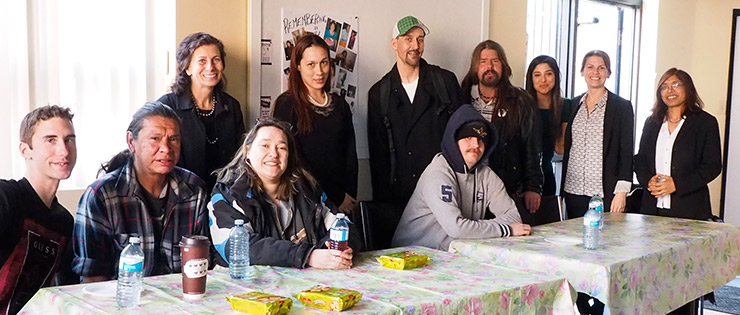Newsroom
Community researchers examine how to help Ottawa’s most marginalized quit smoking
janvier 26, 2017

Community researchers like Kelly Florence and Tiffany Rose are collaborating with Dr. Smita Pakhale to find the best ways to help residents of Ottawa’s inner city reduce the amount they smoke or stop smoking altogether.
Dr. Smita Pakhale wants to know what it would take for one of Ottawa’s inner-city residents to quit smoking. Tobacco is the leading cause of preventable death, and about 96 percent of the city’s most marginalized, including people who are homeless, insecurely housed or multi-drug users, are smokers.
“This is the toughest addiction, it’s the king of addictions” said Dr. Pakhale, a respirologist and associate scientist at The Ottawa Hospital. “When you talk to these people, they really want to quit, and it’s not the first time they’ve tried.”
Dr. Pakhale, who is also an assistant professor at the University of Ottawa, realized she needed an insider’s perspective to find the best way to deliver tobacco health care to this community. So with the help of trusted community members representative of the project’s target population, the team developed a study to identify the barriers to quitting smoking and to uncover what kind of help would work the best.
“As community researchers, we’ve been able to engage right from the project’s conception, and that was great,” said Kelly Florence, a community researcher. “These aren’t just study participants –these are real-life people making real changes in their lives.”
Not only did the community researchers interact with participants as part of the study, but they also spent their evenings on Facebook or on the phone providing them with moral support. Sometimes participants would ask the community researchers to escort them past the cigarette dealers standing outside the doors of the research centre located behind the Shepherds of Good Hope.
“It’s not in our job description, but if it makes it easier for them to come it’s worth it,” said community researcher Tiffany Rose.
Rose also got to learn how to crunch the numbers she collected. “Now I can say I have the skills to enter data, clean data, and analyze it, and I didn’t have that before,” she said.
The preliminary results of the study are promising. They will be released in full once the team publishes them in a peer-reviewed journal.
“I’d like to thank everyone at The Ottawa Hospital who has gotten behind this program in our community,” said Kelly. “It’s a chance to see the good in people who are often perceived in a negative light.”
The Ottawa Hospital: Inspired by research. Driven by compassion
The Ottawa Hospital is one of Canada’s largest learning and research hospitals with over 1,100 beds, approximately 12,000 staff and an annual budget of over $1.2 billion. Our focus on research and learning helps us develop new and innovative ways to treat patients and improve care. As a multi-campus hospital, affiliated with the University of Ottawa, we deliver specialized care to the Eastern Ontario region, but our techniques and research discoveries are adopted around the world. We engage the community at all levels to support our vision for better patient care. See www.ohri.ca for more information about research at The Ottawa Hospital.
University of Ottawa: —A crossroads of cultures and ideas
The University of Ottawa is home to over 50,000 students, faculty and staff, who live, work and study in both French and English. Our campus is a crossroads of cultures and ideas, where bold minds come together to inspire game-changing ideas. We are one of Canada’s top 10 research universities—our professors and researchers explore new approaches to today’s challenges. One of a handful of Canadian universities ranked among the top 200 in the world, we attract exceptional thinkers and welcome diverse perspectives from across the globe. www.uottawa.ca
For further information, please contact
Amelia Buchanan
Senior Communication Specialist
Ottawa Hospital Research Institute
Office: 613-798-5555 x 73687
Cell: 613-297-8315
ambuchanan@ohri.ca
